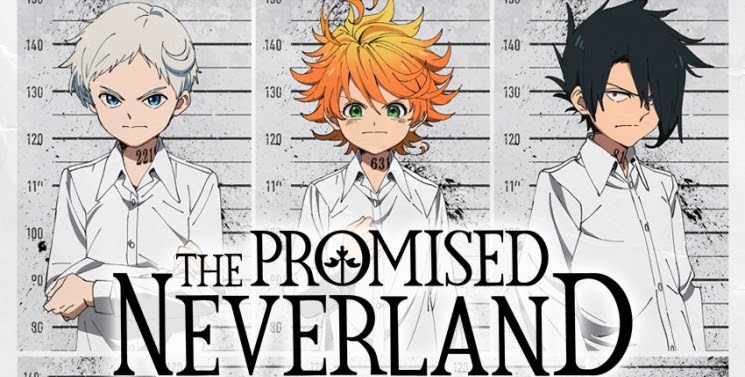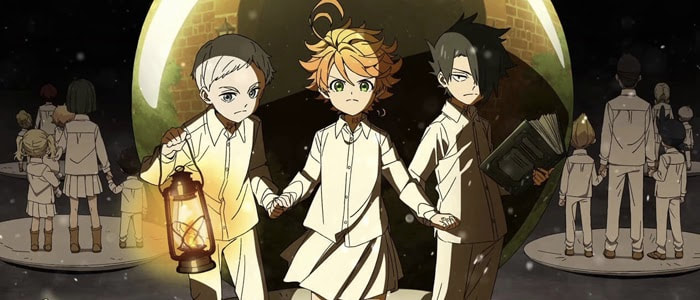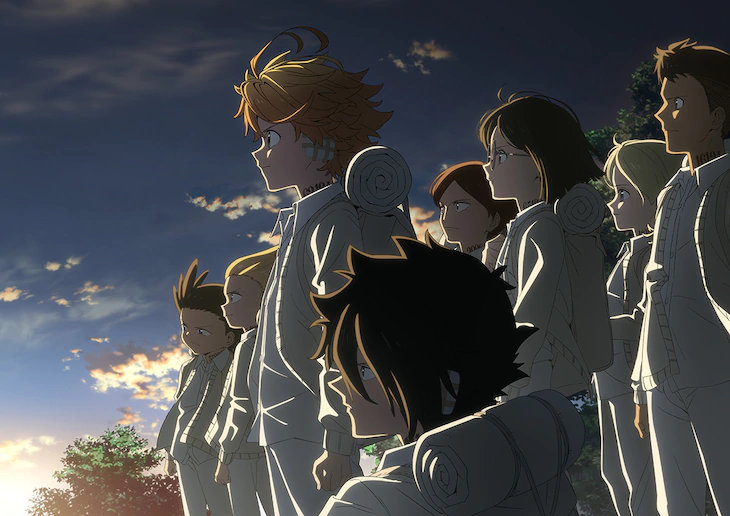
As social distancing continues, audiences may start to find that their list of movies or TV shows to watch has become smaller and smaller. For those who have depleted their watch list, The Promised Neverland (約束のネバーランド), directed by Mamoru Kanbe in 2019, is an extremely underrated animated Japanese TV show that is worth watching.
The first episode begins by introducing the main characters - Emma (Sumiere Morohoshi), Norman (Maaya Uchida), and Ray (Ise, Mariya). They live among other children in an orphanage called “Grace Field House”, with a caretaker who they call “Mama” (Yuuko Kaida). All of the kids are innocent, cute, and seem to be living happy lives in the institution.
However, some things do not seem quite right. For example, the children are not allowed to cross the fenced area outside the main house. Then, as the episode continues, one of the kids is permitted to leave the orphanage through a gate on the opposite side of the property. The caretaker, or Mama, calls it “graduating”. Why do the graduated children never send letters, even if they promise to? Why is Mama the only adult? Why are they not allowed to cross the boundary? As the mystery unfolds, Emma, Norman, and Ray find that they have to risk their lives in order to escape the home they love. Suddenly, their situation becomes a cat and mouse game. One wrong move, one small failure, is equivalent to death.
There are many themes that the anime presents that are relevant to this day. For example, the series plays a lot with despair and hope. The moment the protagonists become hopeful that their situation can improve, despair comes to shut them down. For example, the protagonists of the series realize they are being kept on the property with no visible way out. Similarly, people being quarantined may feel trapped in their own household.
The Promised Neverland is currently only twelve episodes, which differs from more popular anime, which usually contains anywhere from twenty-four to hundreds of episodes. However, because of its length, each episode of The Promised Neverland is packed with a considerable amount of quality. Longer anime series usually have episodes called “filler episodes”, which are basically episodes created for the sole purpose of taking up time. In addition, filler episodes do not usually contribute to the overall plot. The Japanese animated TV show Naruto (Hayato Date, 2002-2017), is notorious for containing around five hundred episodes, but many of which are just fillers.

The presentation of the storyline through art and cinematography is also an important contributing factor to the series. For instance, The Promised Neverland utilizes first person, slow panning shots. There are many scenes where the camera drifts around a dark corner, creating suspense. Many psychological thrillers have used similar techniques to increase uneasiness or fear in the audience. However, this kind of technique is rare in animation since it is a lot harder to do. In real life, the camera would just move, but animated films do not have that luxury. Instead, the animators move the surroundings in a way that gives the illusion that there is a camera.
The interactions between the characters are very intricate. The plot is complex, and so are the relationships between the characters. Although Emma, Norman, and Ray grew up together and are best friends, they have very different motives and notions. For example, Ray has a dark personality, and he is the most realistic of the group. Emma’s personality is pretty much opposite to Ray’s. She is bright, hopeful, and is not afraid to chase dreams even if they seem unreachable. Naturally, although they try to get along, there are times where their ideals clash, and Norman, whose personality falls between the two extremes, has to try and reach a compromise. Ultimately, their shared goal, survival, unites them.

The main antagonist, Mama, is also an important player within the character dynamic. For the main characters, she is the single, most threatening obstacle. She is such a difficult opponent for the children because of her mental aptitude. Her strategies and observation skills are unmatched. Also, since she raised all of the children in the property, she knows all of their ins and outs. As soon as the trio started even thinking about escaping, she could already read it on their faces. Unfortunately for the protagonists, she is heavily against their decision.
The music and sounds also fit within the theme of the story. Whenever exciting events would happen, suspenseful music would play. During emotional moments in the series, the music just takes the scene to another level, and can even send chills down the audience’s spines. The opening theme song is Touch Off by Uverworld, a Japanese rock band consisting of six members.
Overall, The Promised Neverland is a great Japanese animated TV show, and deserves a watch, especially for those who are looking for content. Because of its presentation and storyline, along with well written characters, the series naturally draws the audience in. Each episode actively engages with the audience, allowing them to question every little detail. Even if it is an exhausting mental workout for some, it is still worth the watch.

 RSS Feed
RSS Feed
